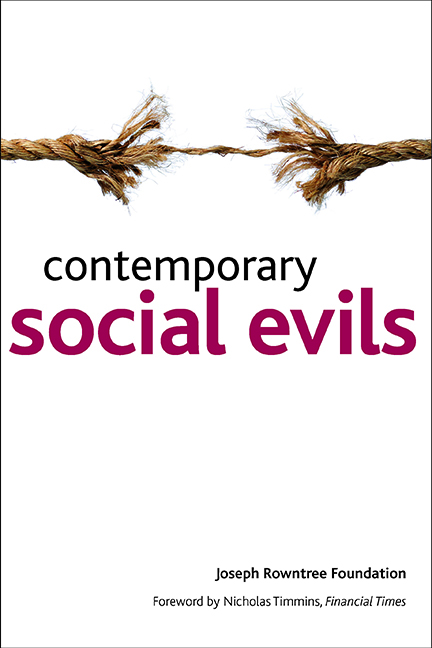Book contents
- Frontmatter
- Contents
- Foreword
- Acknowledgements
- Notes on contributors
- 1 Introduction
- 2 ‘Social evils’ and ‘social problems’ in Britain since 1904
- Section 1 Public Voices
- Section 2 Viewpoints
- A decline of values
- Distrust
- The absence of society
- Individualism
- Inequality
- Section 3 Reflections
- Appendix: How the ‘social evils’ consultations were organised
- Index
15 - Opportunity and aspiration: two sides of the same coin?
Published online by Cambridge University Press: 26 January 2022
- Frontmatter
- Contents
- Foreword
- Acknowledgements
- Notes on contributors
- 1 Introduction
- 2 ‘Social evils’ and ‘social problems’ in Britain since 1904
- Section 1 Public Voices
- Section 2 Viewpoints
- A decline of values
- Distrust
- The absence of society
- Individualism
- Inequality
- Section 3 Reflections
- Appendix: How the ‘social evils’ consultations were organised
- Index
Summary
My starting point for this chapter is the notion of ‘truncated opportunities’: the idea that over the course of life, opportunities can be lost, limited or wasted through circumstances over which we have varying degrees of control. In order to address the inequalities created and exacerbated by truncation of opportunity, we need to reframe the relationship between opportunity and aspiration. And in doing so, we need not only to think about the opportunities and aspirations of individual citizens, but of society as a whole.
The idea of ‘truncated opportunities’ is not merely abstract. It comes from eliciting the voices of people we do not usually hear, even though we often hear about them. We design interventions for them. We talk to them in relation to services – as recipients, non-recipients and potential recipients. We even have labels for them. Some they partly use themselves, like ‘carers’; and others we have bestowed upon them, as in ‘NEETs’ (people not in education, employment or training). Sometimes we remember that they are people first (as in ‘people with learning difficulties’), but on other occasions we do not (as in ‘the unemployed’, ‘the homeless’ or ‘the elderly’).
But how often do we ask them about their lives? As social researchers or policy makers, or even practitioners, how often do we ask people to tell us about their hopes, fears and aspirations beyond whatever aspects of deficit bring them into contact with government or welfare organisations? From my experience as a social researcher, the answer is not very often. I have, of course, conducted some fascinating research with people whose voices might not otherwise have been heard, including vulnerable young people, unmarried parents and people facing discrimination at work. But the bounded nature of social research can be frustrating. At the end of an interview, the digital recorder goes back in the researcher's bag, the consent form is signed and the respondent is reminded of the confidentiality and anonymity of the process. For all that I might want to stay behind and continue talking, I do not, because that would corrupt the research process both ethically and methodologically. It is not normally my role.
- Type
- Chapter
- Information
- Contemporary Social Evils , pp. 181 - 192Publisher: Bristol University PressPrint publication year: 2009



